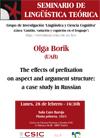Seminario de Lingüística Teórica LyCC: "The effects of prefixation on aspect and argument structure: a case study in Russian"
Por Olga Borik (Univ. Autónoma de Barcelona)
Sala Caro Baroja 1D
Many syntactic-oriented theories conflate aspect and morphology, assuming that processes like prefixation in Russian have a direct influence on the aspectual value of a derived verbal entry. In this talk, I will challenge this position and, eventually, argue against it, on the basis of two arguments. The first argument is empirical and based on a thorough data revision to check the claim that a prefix, indeed, always changes an aspectual value of a base verb it is attached to. I will show that there exist systematic classes of exceptions to this rule. The second argument is conceptual and is based on a theoretical assumption that the semantic contribution of the (im)perfective aspect is essentially temporal (Klein 1995, Borik 2006). However, if, as is generally assumed, aspectual differences in Russian are encoded in verbal morphology, how can a derivational affix influence, and, in general, be associated with the T-shell reflecting temporal relations. How can such a contribution be modeled? As I will show, the situation presents a serious compositionality problem, for which there does not appear to be a solution.
Thus, I will essentially propose that aspect and morphological derivation are two separate processes, much in the spirit of both traditional literature on aspect, e.g. Isačenko (1960) and some of the recent studies, e.g. Gehrke (2008). Then the question that we are left with is the following: is there any way to explain that there is a big overlap between prefixed and perfective verbs or is it just an accident? I will show that the aspect change, when it occurs, seems to occur as a result of some argument structure shift. In search of a motivation for this hypothesis, I am going to explore the effects of prefixation on the argument structure, and especially on the problem of so-called unselected objects, which, to the best of my knowledge, has been scarcely addressed for Russian. I will address the problem of unselected objects from both syntactic and semantic perspective.
Organiza: Grupo de Investigación Lingüística y Ciencia Cognitiva. Línea Cambio, variación y cognición en el lenguaje.



